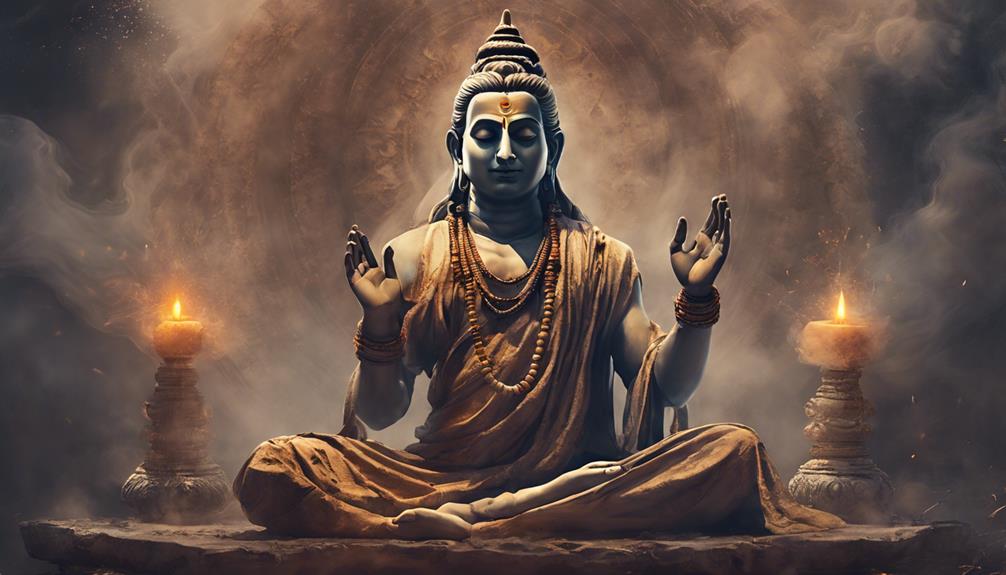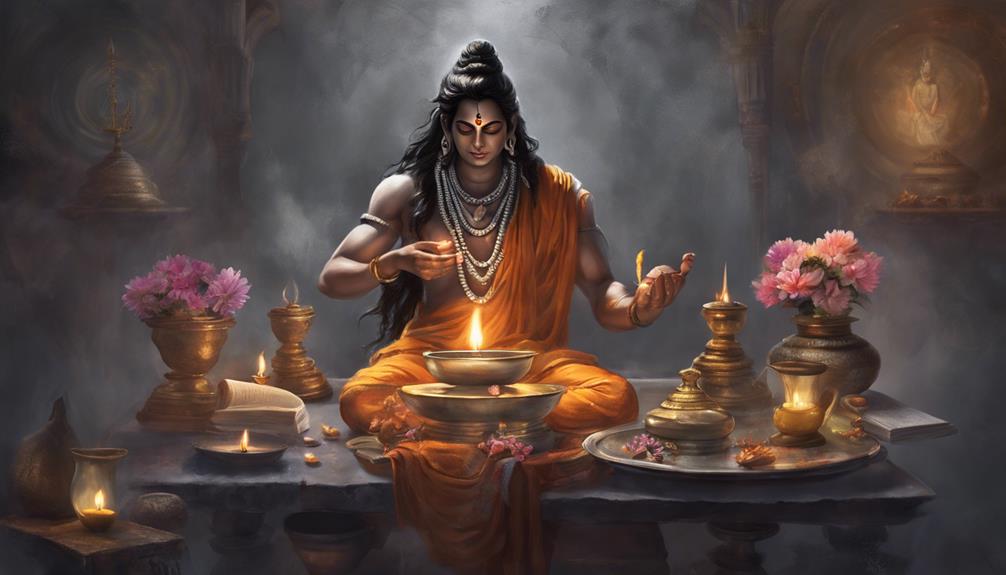In Hinduism, worshipping Lord Shiva entails meticulous shrine preparation, placing the shrine in the northeast corner adorned with humble decorations, offering sacred items like milk, water, honey, and reciting mantras and prayers with sincere devotion. The chanting of powerful mantras such as the Maha Mrityunjaya Mantra and engaging in rituals like Abhishekam further deepen the spiritual connection with Lord Shiva. By celebrating festivals such as Shivaratri with fasting, offerings, and prayers, one can experience a profound sense of spiritual growth and connect with the divine energies that govern cosmic balance.
Table of Contents
Key Takeaways
- Place shrine in northeast corner for auspicious energy flow.
- Offer milk, honey, Bilva leaves, and incense to Lord Shiva.
- Chant powerful mantras like Maha Mrityunjaya for blessings.
- Perform Abhishekam to cleanse and connect with divine energies.
- Celebrate Shivaratri with fasting, prayers, and offerings.
Shrine Preparation and Placement
Setting up and positioning a shrine for Lord Shiva in Hinduism involves thoughtful consideration of auspicious energy flow and maintaining a sacred ambiance. When establishing a shrine for Lord Shiva in your home, it is crucial to select a location that enables the smooth flow of positive energy. Placing the shrine on an altar in the northeast corner of a room is deemed ideal for inviting blessings into your home. The shrine should be adorned with simple decorations, focusing primarily on a single representation of Lord Shiva. This simplicity helps devotees maintain their concentration and reverence during worship.
As part of shrine preparation for home worship, it is advisable to create a pooja room in front of the shrine. This space serves as a designated area for meditation and offering prayers to Lord Shiva. While it is common to have a shrine for personal worship at home, it is recommended to avoid creating such a sacred space at work to uphold the sanctity of the practice. Embracing these guidelines ensures that your home shrine to Lord Shiva fosters a spiritually enriching environment for your devotion.
Offerings to Lord Shiva
When offering worship to Lord Shiva in Hinduism, it is customary to present various sacred items such as milk, water, honey, yogurt, and ghee. These offerings symbolize purity, nourishment, and devotion to Lord Shiva. Additionally, Bilva leaves hold a special significance and are often offered to Shiva during worship as they are believed to be very dear to him. Some devotees also choose to offer fruits, coconut, and sugarcane to Lord Shiva as part of their rituals, signifying their gratitude and respect.
Apart from these offerings, devotees frequently use sandalwood paste, vermilion, and incense while worshipping Lord Shiva. These items are utilized to invoke a sense of spirituality and sanctity during the worship. Moreover, devotees may choose to offer special prayers, mantras, and hymns to express their reverence and seek blessings from Lord Shiva. Through these offerings and rituals, devotees aim to deepen their connection with Shiva and seek his divine grace in their lives.
Chanting Mantras and Prayers

Chanting sacred mantras with devotion and chanting prayers with sincerity are essential practices to honor and seek the blessings of Lord Shiva. The power of prayer offerings through hymns and mantras is believed to invite the divine presence of Lord Shiva into one's life, granting spiritual strength and guidance. Embracing these traditional practices can deepen your connection with Lord Shiva and bring about a sense of peace and fulfillment in your spiritual journey.
Sacred Mantras for Devotion
In the devotion of Lord Shiva, the recitation of sacred mantras holds profound significance and power. Chanting the Maha Mrityunjaya Mantra invokes blessings and protection from Lord Shiva. The Rudram Chamakam hymn is a devotional prayer expressing the diverse aspects of Lord Shiva's divine nature. Reciting the Shiva Panchakshara Stotram, which includes the powerful mantra 'Namah Shivaya,' is a popular way to seek the grace of Lord Shiva. The Mrityunjaya Mantra, known as 'Om Tryambakam Yajamahe,' is believed to bestow longevity, health, and spiritual well-being when chanted with sincere devotion. Engaging in Japa, the meditative repetition of sacred mantras like 'Om Namah Shivaya,' is a common practice to deepen one's spiritual connection with the divine Lord Shiva.
Power of Prayer Offerings
Offering prayers and chanting mantras play a pivotal role in harnessing the divine power of Lord Shiva in Hindu worship. Within the sacred walls of Shiva temples, devotees engage in the recitation of powerful mantras like the Maha Mrityunjaya Mantra and the revered 'Om Namah Shivaya' to express their devotion and seek blessings. These mantras are believed to have transformative energies that aid in spiritual connection and growth. Reciting prayers and hymns dedicated to Lord Shiva, such as the Shiva Panchakshara Stotram, is a way for worshippers to invoke the divine presence of Shiva and align themselves with his cosmic energy. Regular engagement in prayer rituals with sincerity and faith is essential for those seeking to deepen their connection with Lord Shiva.
Rituals Like Abhishekam
As you enter the sacred domain of Abhishekam, you partake in the profound act of bathing the Shiva Lingam with divine substances. Through this ritual, you cleanse not only the physical form of Lord Shiva but also your own spirit, inviting blessings and spiritual growth into your life. The pouring of sacred offerings symbolizes your devotion, reverence, and heartfelt connection to the divine presence of Lord Shiva.
Sacred Pouring Ceremonies
Performing the sacred pouring ceremony known as Abhishekam involves devoutly pouring various liquids over the revered Shiva Lingam in worship of Lord Shiva. The act of Abhishekam holds deep symbolic significance as each liquid used, such as milk, yogurt, honey, ghee, sandalwood paste, and water, represents purity, devotion, and auspiciousness. By partaking in Abhishekam, devotees seek the blessings and grace of Lord Shiva, expressing their reverence and gratitude towards the divine. This ritual is a way to connect with the spiritual domain, purify the soul, and invite divine energies into one's life. Through the sacred pouring of these liquids, devotees believe they can attain spiritual upliftment and experience a closer bond with Lord Shiva.
Symbolic Cleansing Rituals
In the domain of Hindu worship, embodying symbolic cleansing rituals akin to Abhishekam serves as a profound act of spiritual devotion and reverence. Abhishekam, a ritual where sacred liquids like water, milk, and honey are poured over the Shiva Lingam, symbolizes purification and the offering of prayers to Lord Shiva. This act, accompanied by mantras and prayers, seeks blessings and grace from the deity. The pouring of these liquids is believed to energize Lord Shiva and establish a spiritual connection between the worshipper and the divine. Abhishekam is a sacred worship practice that fosters a sacred atmosphere through the chanting of hymns, encouraging a deep sense of reverence and devotion towards Lord Shiva.
Devotional Offerings Practice
Pouring sacred substances over the Shiva Lingam in rituals like Abhishekam is a cherished devotional practice in Hindu worship, symbolizing purification, energization, and divine connection. Abhishekam, a sacred ritual devoted to Lord Shiva, involves the pouring of items such as milk, water, honey, ghee, yogurt, sandalwood paste, and vibhuti over the Shiva Lingam. This act is not merely a physical offering but a spiritual practice believed to bring blessings, cleanse the worshipper, and provide spiritual elevation. Through Abhishekam, devotees seek to enhance their connection with Lord Shiva, recognizing the significance of this ritual in fostering a deeper relationship with the divine. The practice of Abhishekam is a profound form of devotion that enriches the bond between the worshipper and the deity.
Celebrating Shivaratri Festival
During the auspicious Shivaratri Festival, devotees immerse themselves in prayer and meditation to honor the divine presence of Lord Shiva. This major Hindu festival, dedicated to Lord Shiva, is celebrated annually with great reverence. Devotees undertake a strict fast on Shivaratri and stay awake throughout the night, engaging in deep prayers and meditation to seek blessings from Lord Shiva. Offerings of milk, water, fruits, and bel leaves are made to the sacred Shiva Lingam during elaborate rituals performed on this day.
Shivaratri holds profound significance as it commemorates pivotal events in Lord Shiva's life, such as the episode of Shiva drinking poison to protect the world and his cosmic dance symbolizing creation and destruction. The festival is believed to cleanse devotees of their past sins, bring blessings into their lives, and provide spiritual upliftment through unwavering devotion to Lord Shiva. By participating in the rituals and practices of Shivaratri, devotees seek to deepen their connection with the divine energy of Lord Shiva and attain spiritual growth.
Daily Worship Routine

Engage daily in the sacred practice of worshipping Lord Shiva through offerings of water, milk, and bilva leaves, invoking divine blessings with the chanting of the Maha Mrityunjaya Mantra. This daily worship routine is a cornerstone of devotion to Lord Shiva in Hinduism. The Maha Mrityunjaya Mantra, a powerful hymn, is believed to protect devotees and bring them closer to Lord Shiva's divine presence.
In addition to offering water, milk, and bilva leaves, devotees perform Abhishekam, a ritualistic bathing of the Shiva Lingam, as a way to honor Lord Shiva. This act symbolizes purification and devotion, strengthening the spiritual connection with the deity. Observing important festivals like Shivaratri is also an integral part of the daily worship routine for Lord Shiva, providing opportunities for heightened devotion and spiritual growth.
Establishing a regular practice of worshipping Lord Shiva not only helps maintain spiritual connection and devotion but also allows devotees to seek blessings, guidance, and inner peace from the benevolent deity. Embrace this daily worship routine with sincerity and reverence to deepen your spiritual journey with Lord Shiva.
Seeking Spiritual Growth
As you commence on your spiritual journey seeking growth, remember that offering prayers and performing rituals with a pure heart can deepen your connection with Lord Shiva. Through the practice of meditation and contemplation, you can cultivate inner peace and clarity, paving the way for spiritual enlightenment. Engaging in devotional songs and chants dedicated to Lord Shiva can uplift your spirit and bring you closer to the divine presence.
Ritual Offerings and Prayers
In seeking spiritual growth through ritual offerings and prayers to Lord Shiva in Hinduism, devotees demonstrate their reverence and devotion. By offering water, milk, and bilva leaves to Lord Shiva, devotees engage in the sacred act of worship. Chanting the potent Maha Mrityunjaya Mantra, dedicated to Lord Shiva, is a common prayer practice that aids in seeking blessings and protection. The traditional act of performing Abhishekam on the Shiva Lingam with water, milk, and other sacred substances symbolizes purification and devotion. Celebrating significant festivals such as Shivaratri with fasting, prayers, and offerings is an essential component of worshipping Lord Shiva. Through daily rituals, prayers, and temple visits, devotees endeavor to attain spiritual growth and enlightenment in the divine presence of Lord Shiva.
Meditation and Contemplation
Meditate on Lord Shiva's divine form and sacred attributes to deepen your spiritual connection and seek inner peace. Through meditation, focus on Shiva's qualities of detachment, compassion, and destruction, contemplating their significance for spiritual growth. Chanting Shiva's mantras and hymns during meditation can help you evoke his divine presence and receive blessings. Visualize Shiva's third eye, trident, and cosmic dance to gain profound insights and spiritual awakening. By immersing yourself in Shiva's energy through contemplation and meditation, you can foster a sense of unity with the divine and undergo spiritual transformation. Embrace the practice of meditation to connect with Lord Shiva on a profound spiritual level, seeking enlightenment and inner harmony.
Devotional Songs and Chants
Contemplate the sacred melodies and hymns devoted to Lord Shiva, immersing yourself in their divine resonance to nurture spiritual growth and seek enlightenment. Devotional songs and chants play a significant role in Hindu worship, offering devotees a means to express their reverence and devotion towards Lord Shiva. Chanting powerful mantras like the Maha Mrityunjaya Mantra is believed to not only invoke spiritual growth but also provide protection. Bhajans and kirtans, which are devotional songs sung in praise of Lord Shiva's qualities and deeds, are commonly incorporated into worship rituals. Engaging in group chanting sessions known as Satsangs not only fosters a sense of community but also deepens one's connection with Lord Shiva, leading to spiritual elevation and a profound spiritual experience.
Protection and Blessings
Seek the protection and blessings of Lord Shiva in Hinduism for a life filled with harmony and prosperity. Worshipped by many for safeguarding against negative energies and obstacles, Lord Shiva is believed to bestow blessings that lead to a harmonious and prosperous life. Devotees turn to Lord Shiva not only for physical protection but also for spiritual growth and enlightenment. By seeking his divine intervention, followers aim to fulfill their desires and wishes, trusting in his guidance for a path of peace and tranquility. The act of worshipping Lord Shiva is seen as a way to invite positivity, ward off negativity, and invite blessings for a fulfilling life journey. Through prayers, rituals, and offerings, individuals express their devotion to Lord Shiva, seeking his grace and protection in every aspect of their lives. Embracing Lord Shiva's blessings is believed to bring about a sense of inner peace and contentment, fostering spiritual growth and a deeper connection with the divine.
Harmonious Life Goals

Embrace the worship of Lord Shiva in Hinduism to harmonize your life goals and aspirations, seeking a balanced path between worldly responsibilities and spiritual growth. The worship of Shiva offers a profound way to integrate the material and spiritual dimensions of your life, fostering a harmonious blend that nurtures both aspects of your being. By dedicating yourself to the worship of Lord Shiva, you can endeavor to achieve a state of equilibrium where you can fulfill your duties in the world while progressing on your spiritual journey.
Through the worship of Shiva, devotees aim to find peace and balance amidst the chaos of daily life. This practice emphasizes the importance of aligning your actions with your inner spiritual aspirations, guiding you towards a life filled with meaning and purpose. By seeking Shiva's blessings and following his teachings, you can navigate the complexities of existence with grace and wisdom, ultimately leading to a harmonious and fulfilling life that reflects the divine presence within you.
Significance of Lord Shiva Worship
Engage in the worship of Lord Shiva in Hinduism to invite tranquility and equilibrium into your life. In the Hindu tradition, Lord Shiva holds immense significance, and worshipping Him is believed to bring calmness and balance to the mind. Monday is considered the most vital day for worshipping Lord Shiva, as it is believed to amplify the benefits of the practice. Offering milk and honey to Lord Shiva on Mondays is a common ritual that is thought to bring good fortune and help manifest desired outcomes. Correctly worshipping Lord Shiva on Mondays can lead to the fulfillment of dreams and aspirations, making it an essential practice for followers. Following specific rituals like Abhishek, the ceremonial bathing of the Shiva Lingam, and chanting mantras on Mondays is crucial for worshipping Lord Shiva with devotion and sincerity. By honoring Lord Shiva on Mondays, one can tap into His divine energy and experience spiritual growth and inner peace.
Frequently Asked Questions
How Do Hindus Worship Shiva?
In your worship of Shiva, honor his symbolism through offerings. Chant sacred mantras and practice meditation techniques. Embrace rituals like Abhishekam and festivals such as Shivaratri. Maintain daily devotion with readings, temple visits, and charity.
What Is the Right Way to Worship Lord Shiva?
To worship Lord Shiva, focus on meditation techniques, sacred symbols, and mantra chanting. Your devotion, pure heart, and faith matter. Offer milk, honey, flowers, fruits, and perform rituals like Abhishek with bhasma and water for a fulfilling connection.
What Are the Rituals of Shiva in Hinduism?
To honor Lord Shiva in Hinduism, embrace sacred offerings, perform ceremonial dances, and chant mantras with reverence. Immerse yourself in devotion, let your heart guide you, and find peace in the rituals.
Why Lord Shiva Is Mostly Worshipped?
You worship Lord Shiva for his symbolism as the destroyer and transformer, seeking protection, guidance, and spiritual growth. His devotees revere him for embodying divine energy, granting boons, and fulfilling desires. Sacred sites honor his presence.
Conclusion
To sum up, worshipping Lord Shiva in Hinduism involves preparing a shrine, making offerings, chanting mantras, performing rituals like Abhishekam, celebrating festivals like Shivaratri, seeking spiritual growth, seeking protection and blessings, and aligning with harmonious life goals. By engaging in these practices, devotees can deepen their connection with Lord Shiva and experience the divine presence in their lives, leading to spiritual enlightenment and inner peace. Lord Shiva's worship is a sacred journey of devotion and transformation.